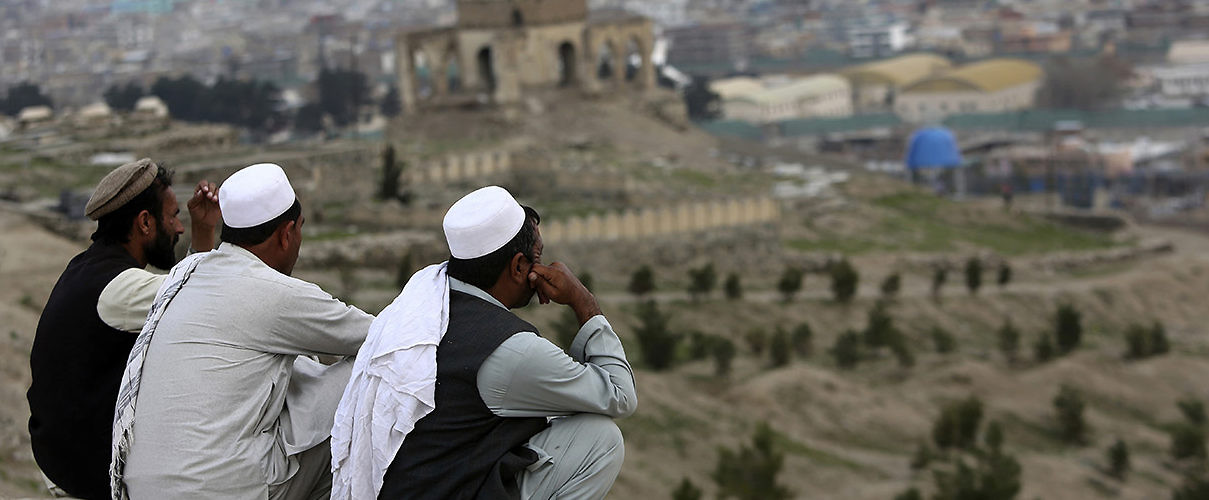Men sit on the Nadir Khan hilltop overlooking Kabul, Afghanistan. March 27 (Rahmat Gul/Associated Press)
A United States delegation to Kabul last week hinted at Washington adopting a harder military line on defeating the Taliban, as well as a familiar focus on Pakistan managing Afghanistan’s insecurity. Whether the US might commit to potentially domestically unpopular re-engagement with the conflict remains doubtful, though it did recently deploy its largest non-conventional bomb against forces of the so-called Islamic State in the country. A potentially larger issue is whether Washington will welcome revived interest from other regional actors, primarily Russia, in seeking peace in Afghanistan.
Recent figures released by the UN Assistance Mission in Afghanistan and the US government’s Special Inspector General for Afghanistan Reconstruction point to a dramatic reversal in fortunes for Kabul since the 2014 drawdown in American forces. Almost 43% of national territory has been wrested from government control, while civilian casualties have hit new highs. Indices show social progress is also stagnating and a flailing economy is dealing further blows. The rising threat of ISIS in turn poses a fresh challenge.
Military solutions to the Afghan problem have achieved only limited, temporary progress to date; as have almost all previous international negotiations. The previous rounds of peace negotiations promoted through the Quadrilateral Coordination Group—comprised of China, the US, Pakistan, and Afghanistan—suffered various setbacks, including power struggles within the Taliban following the deaths of leaders Mullah Omar and Mullah Mansour.
Newer talks led by Russia promise to take a more regional approach. The six-party negotiations also bring in Iran, India, China, and Pakistan alongside Afghanistan. But, as I have previously argued, the parties are approaching peace according to their own, often conflicting calculations. Russia, fresh from its purported success in Syria, is looking to revive its role in Afghanistan—and Central Asia more broadly—in the absence of a clear US policy toward the country. Pakistan is working to convince others of the greater threat of ISIS when compared with the Taliban and to try to politically mainstream the latter. China partly wants to manage its own Islamic extremist threat in Xianjing and partly to ensure security for the China-Pakistan Economic Corridor and its One Belt, One Road infrastructure initiative. Iran has become increasingly regionally active since the lifting of its international sanctions, which included moving closer to the Taliban—which it once opposed—and even allowing the group to maintain offices in Sistan-Baluchistan province. India’s interest, finally, stems from its desire to manage the potential mainstreaming of the Taliban and avoid conflict in South and Central Asia.
For progress to occur within any platform there must be a renewed commitment to bringing the Taliban further into the process. It is the only potentially game-changing option remaining, considering that more than 15 years of directly attacking the group has failed to yield permanent results. The recent signing of a peace accord between the Afghan government and the Gulbuddin Hekmatyar led Hezb-e-Islami (HIG), a militia that at one point declared its allegiance to ISIS, offers some hope that this might one day be achievable. Yet the HIG is also a much smaller and geographically constrained entity than the Taliban and the journey to getting to such a stage was by no means easy. Despite some reports of internal bickering within the Taliban, it continues to hold a massive amount of bargaining power vis-à-vis the Afghan government and its international backers. The group’s recent capturing of provincial capitals; continued control of the economically vital poppy cultivation trade, and reports of direct engagement with Russia, Pakistan, and even Iran, have ensured its ongoing importance.
However, renewed international tensions between regional and international powers may preclude negotiations with the group from occurring any time soon. While the US and Russia have both suggested the need for an eventual settlement between Kabul and the Taliban, Washington has refused to take part in the Russian-led talks, and American officials allege that Moscow may even be providing military support to the Islamists.
Renewed tensions were also evident in the Russian envoy to Afghanistan, Zamir Kabulov, supporting the Taliban’s demand for the withdrawal of foreign, primarily American-led, forces from Afghanistan before peace talks can take place. Prospects for peace seem to have further suffered with the failure of a thaw in ties between the US and Russia to materialize following the election of Donald Trump.
Even within the Russian-led process there are divergences of opinion on such talks, with India and Afghanistan steadfastly maintaining that reconciliation is possible only upon the Taliban’s complete renunciation of violence. For India in particular, a politically weak Afghanistan that is susceptible to falling to hardline Islamist extremism is a source of grave danger. To this effect, it has provided development assistance to Afghanistan with the intent of bolstering the government’s ability to deliver basic services to its people and ensure greater political legitimacy as a result.
Fragmentation of the Taliban by external partners allied to different factions will certainly not benefit the peace process; past division has simply produced new groups with new chains of command. As things stand, a revival of historical Afghanistan-focused tensions such as the Great Game of the 19th century or the Cold War of the following one seems more likely than a genuine partnership for peace. Obstacles to talking with the Taliban are coming despite an emerging consensus on its urgent need, and, indeed, the fact that all parties in the six-party talks have already established formal channels of communication with the group.
Chayanika Saxena is a Research Associate with the Society for Policy Studies, New Delhi





